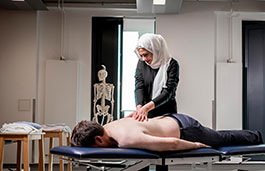Search
Occupational Therapy (pre-registration) MSc
Study level: Postgraduate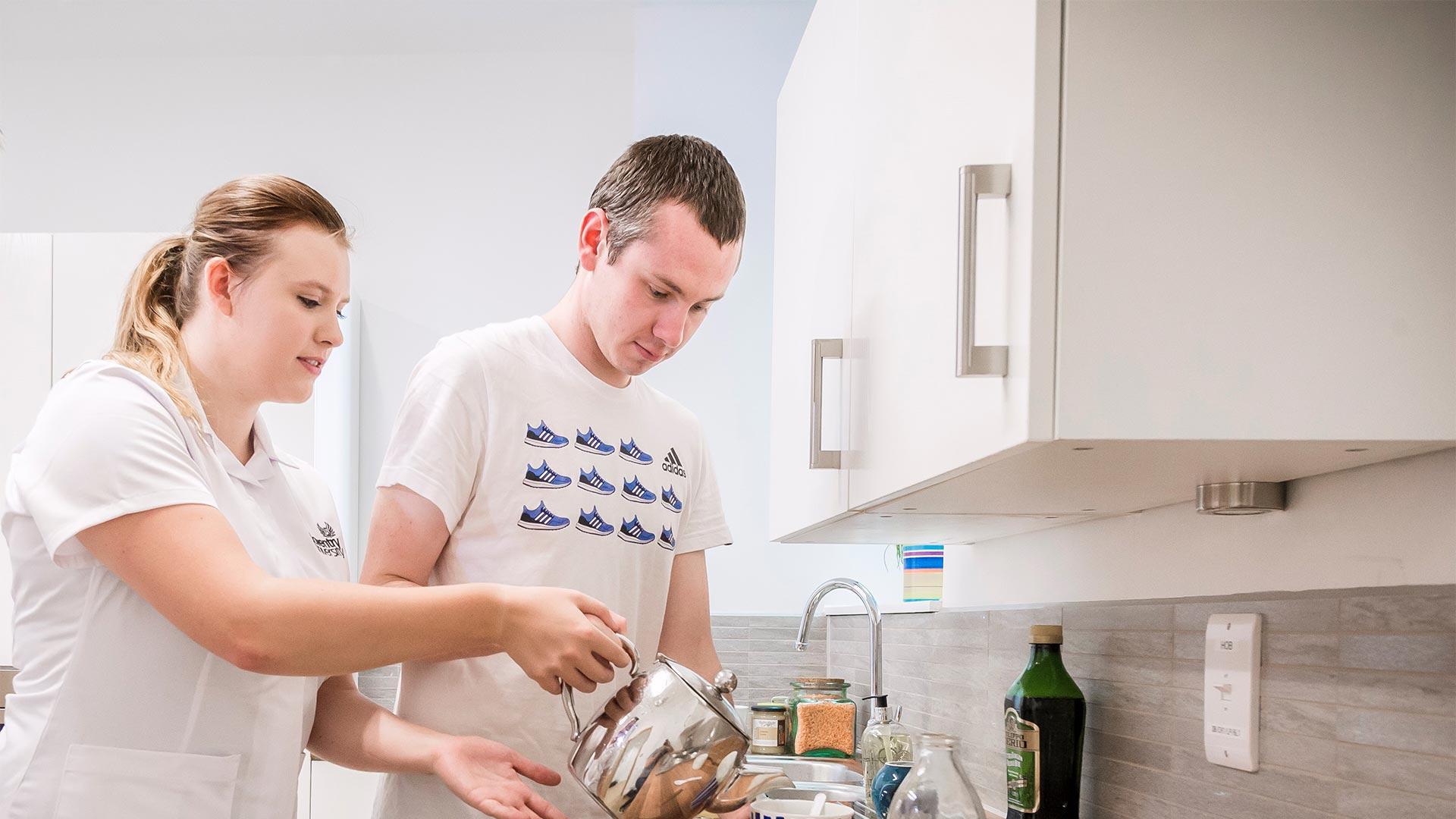
As a registered Occupational Therapist, you will have the privilege to work with people of all ages to help them participate in occupations that hold personal meaning and value to them.
Year of entry
2024-25
Location
Coventry University (Coventry)
Study mode
Full-time
Duration
2 years full-time
Course code
HLST241
Start date
January 2025
Course overview
Occupational Therapists are the only profession that uses occupation (the things people do every day which can affect their health and wellbeing) as a therapeutic tool to improve their health, wellbeing and quality of life, enabling them to live the life they want.
- Throughout the course you will have the opportunity to enhance your attributes as a compassionate and caring critical thinker with an inquisitive and problem-solving mind, as well as developing your communication skills with people of all ages and abilities.
- You will undertake three professional practice placements during the course in diverse, contemporary and community environments which are tailored to learning needs2,5.
- The two-year postgraduate course leads to eligibility to register with the Health and Care Professions Council (HCPC) (additional costs may apply).
- All eligible home students on this course can apply for a minimum payment from the Government of £5,000 per year, with additional payments for students incurring childcare costs6.
Rated Gold Overall
Teaching Excellence Framework (TEF) 20235 QS Stars for Teaching and Facilities
QS Stars University RatingsTop 5 Student City in England (Coventry)
QS Best Student Cities Index 2025Why you should study this course
This master’s level, pre-registration qualification in occupational therapy has been designed to enable the potential for accelerated career opportunities and provides the opportunity to also gain an additional qualification in leadership from the Chartered Management Institute (CMI)1 with the intention to enable you to make a valuable contribution to improve the quality of services.
The skill set you will have developed on successful completion of this course can allow you to work in specialities such as paediatrics, elderly care, mental health, learning disabilities, end-of-life care, forensics, schools and emergency services, to name just a few.
Coventry University offers an advanced learning environment for healthcare professionals. Facilities of particular relevance to occupational therapists include two fully equipped community houses to help you to develop your clinical skills in simulated practice scenarios and explore developments in assistive and adaptive technologies4.
The distinctive features of this course include:
- Embedded leadership skills and a specific CMI-accredited qualification (see accreditation section for further information)
- Innovative and varied assessment, specifically designed to reflect skills required in occupational therapy practice
- Collaborative working with service users to simulate real-world environments
- Collaborative working across multi-professional groups enhancing professional identity, knowledge and behaviours
- Guided development of an employability portfolio designed to enhance career opportunities
- A commitment to working in collaboration with students to continually develop and further enhance the programme
- Strong links with a wide range of local health trusts, social services, private health, charitable and voluntary organisations that provide practice development activities2.
Accreditation and professional recognition
This course is accredited1 by the following bodies:
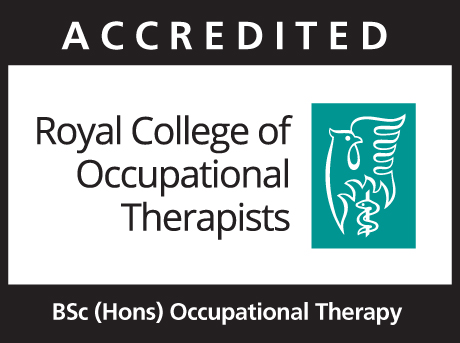
Royal College of Occupational Therapists
This course is accredited by the Royal College of Occupational Therapists until 2025. This enables you to become a student member of the Royal College of Occupational Therapists (subject to application and additional costs).
When enrolled on the course, you have the opportunity to become a student member of the Royal College of Occupational Therapists (subject to application and additional costs). Please visit the Royal College of Occupational Therapists website for more information, or speak to your Course Director to find out more.
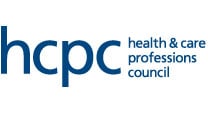
Health and Care Professions Council
This course is accredited by HCPC for the 2023/24 intake.
As an accredited course by the Heath and Care Professions Council, this course aims to educate you to become a graduate occupational therapist who is eligible to apply for registration as an occupational therapist with the Health and Care Professions Council (HCPC) (subject to application and additional costs).

Chartered Management Institute (CMI)
As part of this course, you will undertake a professional development module which is currently accredited by the Chartered Management Institute for the 2023-24 intake. Upon successful completion of this module, you will gain the CMI Level 7 Certificate in Strategic Management and Leadership Practice at no additional cost.
Payment for Occupational Therapy students
Eligible students on the Occupational Therapy degrees can apply for a £5,000 per year non repayable payment from the UK government.6
What you'll study
We regularly review our course content, to make it relevant and current for the benefit of our students. For these reasons, course modules may be updated.
How you'll learn
You are encouraged to engage in a variety of discussions, simulation, practical and group-work learning activities and have the opportunity to share your own learning and practice experiences with lecturers and peers.
Service users and carers, special visiting lecturers and representatives from health and social care, work in collaboration with lecturers in delivering the course in order to deliver educationally transformative learning experiences.
Teaching contact hours
Contact hours for teaching vary according to the modules you are studying. In a typical week during semester one you will have up to 12 contact hours of teaching per week which is made up of lectures, workshops and seminars.
In addition, you will be expected to undertake a minimum of 20 hours of self-directed study each week, e.g. working on course assignments and group work. There will also be clinical skills workshops in preparation for clinical practice placements, which include moving and handling, CPR and hand washing.
During semester two you will complete two weeks of online learning before starting a 10-week part-time placement for 3 days a week. Alongside this placement, you will have some additional teaching and will study the CMI module. Placements two and three are full-time placements within practice (approximately 37 hours per week).
The contact hours may be made up of a combination of face-to-face teaching, individual and group tutorials, and online classes and tutorials.
As an innovative and enterprising institution, the university may seek to utilise emerging technologies within the student experience. For all courses (whether on-campus, blended, or distance learning), the university may deliver certain contact hours and assessments via online technologies and methods.
Since COVID-19, we have delivered our courses in a variety of forms, in line with public authority guidance, decisions, or orders and we will continue to adapt our delivery as appropriate. Whether on campus or online, our key priority is staff and student safety.
Assessment
Course assessment has specifically been designed to reflect the skills required in occupational therapy practice and includes:
- Presentations
- Critical reflections
- Reports
- Case-based oral assessment.
The Coventry University Group assessment strategy ensures that our courses are fairly assessed and allows us to monitor student progression towards achieving the intended learning outcomes.
International experience opportunities
Opportunities for an international experience exist across the department, school and university. An example of this would be a study tour to experience health care within a different country2.
Please note that all international experience opportunities may be subject to additional costs, competitive application, availability and meeting applicable visa and travel requirements are therefore not guaranteed2.
Entry requirements
Typical offer for 2024/25 entry.
Fees and funding
2024/25 tuition fees.
| Student | Full-time | Part-time |
|---|---|---|
| UK, Ireland*, Channel Islands or Isle of Man | £9,250 per year | Not available |
| EU | £9,250 per year with EU Support Bursary** £18,600 per year without EU Support Bursary** |
Not available |
| International | £18,600 per year | Not available |
For advice and guidance on tuition fees3 and student loans visit our Postgraduate Finance page.
We offer a range of International scholarships to students all over the world. For more information, visit our International Scholarships page.
Tuition fees cover the cost of your teaching, assessments, facilities and support services. There may be additional costs not covered by this fee such as accommodation and living costs, recommended reading books, stationery, printing and re-assessments should you need them.
The following are additional costs not included in the tuition fees:
- Any optional overseas field trips or visits: £400+ per trip.
- Any costs associated with securing, attending or completing a placement (whether in the UK or abroad).
*Irish student fees
The rights of Irish residents to study in the UK are preserved under the Common Travel Area arrangement. If you are an Irish student and meet the residency criteria, you can study in England, pay the same level of tuition fees as English students and utilise the Tuition Fee Loan.
**EU Support Bursary
Following the UK's exit from the European Union, we are offering financial support to all eligible EU students who wish to study an undergraduate or a postgraduate degree with us full-time. This bursary will be used to offset the cost of your tuition fees to bring them in line with that of UK students. Students studying a degree with a foundation year with us are not eligible for the bursary.
Facilities
Our teaching facilities4 in the Alison Gingell Building include dedicated laboratories for anatomy, electrotherapy and manual skills, hospital wards, critical care settings, community housing and other real-life environments relevant to practice.
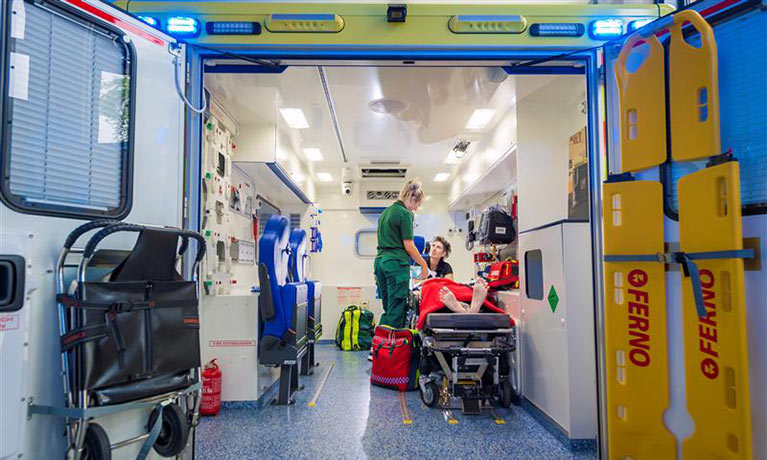
Alison Gingell Building
The Alison Gingell Building features mock hospital wards, an operating theatre, critical care settings and other real-life environments.
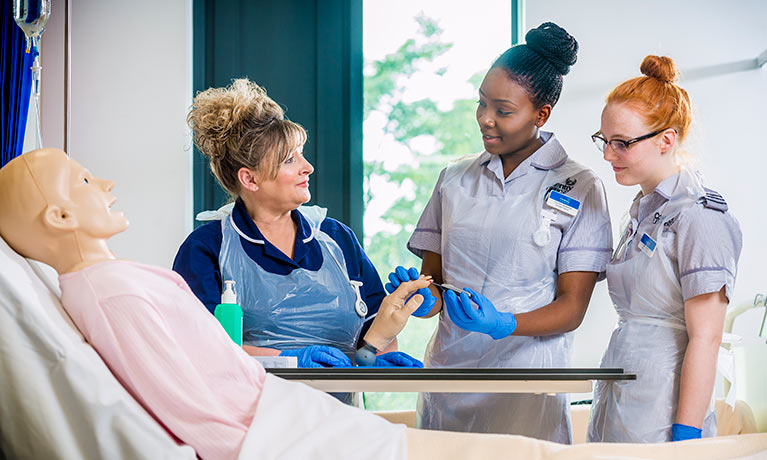
Mock Hospital Wards
Our mock hospital wards and critical care settings give you the chance to experience patient scenarios in a real-world environment.
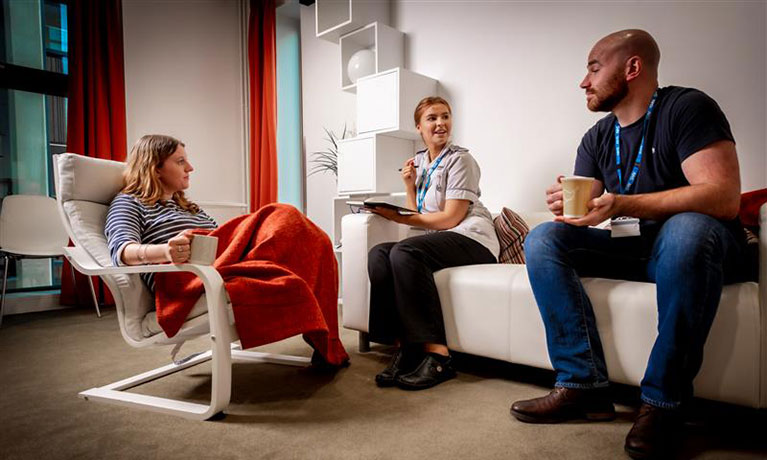
Community Houses
Our two full-size community homes can be used for sessions simulating working with patients outside of a hospital setting.
Careers and opportunities
On successful completion of the course, you will be able to:
- Evidence a critical understanding of the complexity of human occupation and its centrality in relation to health and wellbeing
- Demonstrate an understanding of the core principles and values of occupational therapy and their application to person-centred practice across the lifespan for individuals and groups within and across communities
- Critically evaluate therapeutic reasoning and practice and the contribution of occupational therapy knowledge, skills and behaviours to service delivery and communities of practice
- Critically appraise intercultural competencies at a national and international level, to practice as an autonomous healthcare professional, and to be able to appraise your own intercultural development in order to enhance your lifelong learning
- Apply collaborative capabilities that promote integrated learning and working within public, private and third sector organisations, for the health and well-being of people in our community
- Manage your own personal health and wellbeing and have insight and self-awareness of when and how to access support, as emotionally intelligent and resilient individuals
- Appraise and create research as evidence-informed practitioners within the context of health and social care
- Critically examine your leadership capabilities to enable you to continually improve and influence service development
- Be an innovative and creative practitioner who critically engages and participates in an evolving technological arena demonstrating digital fluency
- Demonstrate knowledge and understanding of the principles required to lead diverse workforces and the theories and practices of strategic leadership.
On successful completion of this course you will be eligible to apply to register with the HCPC as a registered Occupational Therapist (additional fees to HCPC apply).
The master’s level curriculum has been designed to develop the potential for accelerated career opportunities and provide an additional qualification in leadership from the Chartered Management Institute (CMI)1 to enable you to make a valuable contribution to improve the quality of services. In addition an employability portfolio will enable regular reflection upon the development of skills and learning and will provide the potential for enhancement of employability and career development prospects.
Where our graduates work
Occupational Therapists have a wide range of employment opportunities including the NHS, social care, charities, education, private employers and within independent practice.
Graduate Immigration Route visa
Based on current information from the UK Government, international students whose study extends beyond summer 2021 may be eligible for a visa under the UK Government’s Graduate Immigration Route, which will enable students to stay and work, or look for work, in the UK at any skill level for up to two (2) years. Check the most up to date guidance available to check your eligibility and any updates from the UK Government before making an application or enrolment decision.
How to apply
You may also like

